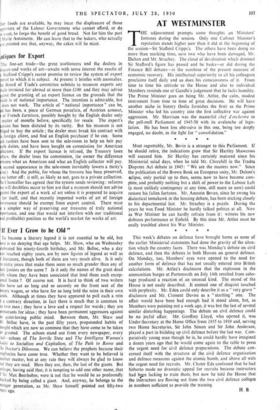ntiques for Export
The fine-art trade—the great auctioneers and the dealers in tiq ties and works of art—awaits with some interest the results of Stafford Cripps's recent promise to review the system of export ntrol to which it is subject. At present it bristles with anomalies. e Board of Trade's committee submits to museum experts any icle invoiced for•abroad at more than £.100, and they may advise ainst the 'granting of an export licence on the grounds that the tide is of national importance. The intention is admirable, but does not work. The article of " national importance " can be, d has .been, a piece of German porcelain, of Austrian armour, of French furniture, possibly bought by the English dealer only matter of months before, specifically for resale. The expert's cision has been dictated by its rarity. But his museum is not liged to buy, the article ; the dealer must break his contract with s foreign client, and find an English purchaser if he can. Some ch rarities have been sent to the sale-room to help an heir pay ath duties, and have been bought on commission for American Hectors. If the export licence is refused, the Treasury loses liars, the dealer loses his commission, the owner the difference tween what an American and what an English collector will pay. second appearance in the sale-room inevitably lowers a rarity's lue.) And the public, for whom the treasure has been preserved, no better off : it still, as likely as not, goes to a private collection.
e Chancellor has agreed that the system needs reviewing : reforms at will doubtless occur to him are that a museum should not advise ainst the export of a work of art unless it is prepared to acquire for itself, and that recently imported works of art Of foreign ovenance should be exempt from export control. There must a simpler way of preserving our treasures of truly national portance, and one that would not interfere with our traditional rid profitable) position as the world's market for works of art.


































 Previous page
Previous page